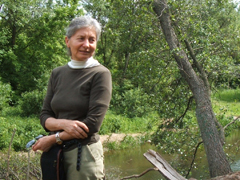Shape Shifter
By Jim Oldfield
So, you want to be a lab manager?
The desire is there. What else do you need?
- Master of science degree, e.g., in biomedical engineering or physics
- Good knowledge in an appropriate field, e.g., medical imaging, acoustics, biophysics
- Computer skills, e.g., C, C++, Windows, Matlab
- Developed interpersonal skills
- Several years' experience as a lab technician or research coordinator
- Experimental skills
- Knowledge of instrument control
As a woman with a master's degree in solid-state electronics, unable to complete her PhD program at the University of Warsaw in the 1970s due to political unrest, Kasia Harasiewicz knows well the value of flexibility in the face of adversity.
Instead of giving up on her chosen field of study—a fate to which many of her compatriots succumbed—Harasiewicz immigrated to Canada in 1982 and took a job as senior technician in medical biophysics at the Ontario Cancer Institute in Toronto.
It was, she says, the best career move she ever made. Harasiewicz can now look back on an accomplished work history that includes a key role in the development of ultrasound biomicroscopy—an imaging technique that enables noninvasive visualization of nearly microscopic physiology—and a progression from hands-on electronics engineer to all-around lab manager and research engineer.
Throughout that progression, pliancy and resilience are the strands with which Harasiewicz has woven an unconventional career.
As the "go to" resource in the labs of two Sunnybrook Research Institute imaging scientists—Dr. Stuart Foster, with whom she has worked for 28 years, and Dr. Peter Burns—Harasiewicz delves into a dizzying array of activities during a typical day.
"You have to be very adaptable," says Harasiewicz, between phone calls and impromptu visits from research staff seeking counsel for various roadblocks—from the administrative to the highly technical. "That is something I love in the research environment. You do what's needed."
Equipment that works; materials for experiments; matching people with projects; lab safety; accounts payable; grant proposals; progress reports: these are some concerns that compete for Harasiewicz's time.
"I have a spreadsheet for each grant, so I know what milestones we should achieve and what we can spend. If people need equipment or supplies, I know if we can cover them from a specific grant," she says.
Harasiewicz handles 15 grants, which fund the work of 22 staff. "When you have this many people, you need a lab manager to keep the environment, and them, sane," she says.
No Substitute for Experience
Not all scientists concur. Some, notes Harasiewicz, prefer that a flow of recent graduates, most of whom are still learning the ropes, perform the various tasks needed to keep a lab running smoothly. This approach encourages fresh perspectives, provides learning opportunities for young staff and keeps salary costs low.
But the drawbacks are lack of experience and continuity—critical for keeping long-term research projects on track. As a highly qualified employee in the lab of Foster, Harasiewicz has grown with the needs of the lab, and has an intricate, seamless knowledge of Foster's research and what makes his lab efficient.
Contributing to Innovation
The success of Foster's research program—Toronto start-up company VisualSonics, spun from research by Foster's team, has brought real-time, in vivo, ultrasound biomicroscopy to hundreds of research and clinical organizations around the world—suggests the latter approach has worked well in his lab.
Ultrasound biomicroscopy is a fantastic achievement, says Harasiewicz, and it's the accomplishment of which she is most proud. But another highlight of her career has been working with bright, open-minded people and watching them progress in their careers.
Their progress, she notes—like hers—depends on the right attitude. "You don't make a lot of money in research, so you have to like the environment," she says. "You have to know how to adapt, to solve problems in unorthodox ways. If you have curiosity and a genuine interest in research, then this is the place for you. It's wonderful."






